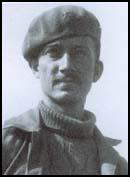Philip Detro

Philip Detro was born in Conroe, Texas, in 1911. His mother had come from a wealthy family that has lost its money and after his birth had to find work as a teacher.
Detro graduated from Davy Crockett High School in 1928 but after a short time at the Rice Institute he became a seaman. In 1932 he was in Nazi Germany when he heard Adolf Hitler make a speech. This resulted in Detro becoming an anti-fascist.
In 1934 Detro enrolled at the University of Missouri in the journalism program. He also studied Spanish and creative writing. One fellow student felt he was "a restless soldier-of-fortune type." He also took flying lessons. After poor grades at university he moved to New York in an attempt to become a writer.
On the outbreak of the Spanish Civil War he attempted to join the Abraham Lincoln Battalion, a unit that volunteered to fight for the Popular Front government against the military uprising in Spain. However, the American Communist Party turned him down. In his book, Comrades and Commissars: The Lincoln Battalion in the Spanish Civil War (2007), Cecil D. Eby suggests that this was because he was "a poor political risk". However, John Gates later recalled that Detro was an undercover member of the party.
After the disaster of Jarama the leaders of the American Communist Party changed its mind about the role of its activists and allowed Joe Dallet, Steve Nelson, David Doran and 22 other volunteers to go to Spain. At the Tarazona training camp Detro impressed his tutors and this 6ft 4in soldier was marked down as a future officer.
During the fighting at Fuentes de Ebro Detro took over from Hans Amlie as commander of the Lincoln-Washington Battalion. He was injured at Mosquito Ridge and therefore missed the Quinto campaign. According to Cecil D. Eby he refused to wear tailored uniforms like Robert Merriman and David Doran: "Detro invariably wore a faded beret and a turtleneck sweater several sizes too large for his thin chest."
Philip Detro was shot by a sniper while fighting in Teruel in January 1938. He was rescued by Joe Bianca and taken to the dressing station. The doctor found that he had a compound fracture in the right femur. He was advised to have his leg amputated but he refused and he died of gangrene six weeks later in a Murcia hospital.
Primary Sources
(1) Cecil D. Eby, Comrades and Commissars: The Lincoln Battalion in the Spanish Civil War (2007)
Aboard ship, Detro began to fancy himself as a writer. In 1934 he quit the Merchant Marine and enrolled at the University of Missouri in the journalism program. He joined Alpha Tau Omega, a fraternity for Southern gentlemen, and took flying lessons at Columbia Field. Classmates felt he was "a restless, soldier-of-fortune type." In one semester he completed third-year Spanish and flunked creative writing. At year's end he was "excused from the university" for having accumulated seventy-seven overcuts in his classes-something of a local record. For a year he worked in New York for a writers' syndicate.
When Detro heard that the Republic was recruiting fliers at fancy prices, he submitted an application to the Spanish consul but learned he had not logged enough hours. He then tried to join the Lincoln Battalion, but the Party turned him down, probably as a poor political risk. But after the Jarama fiasco he was accepted because of his National Guard and ROTC experience, limited as this was. On the boat going over, when another volunteer asked him what he thought of the Spanish situation, the gangly Texas drawled, "Back where I come from, they think Spain is too far away to affect the price of cotton." He enjoyed the role of political dummy, like the time he said he thought the "class struggle" had to do with getting from class to class at the University of Missouri."'
At Tarazona he commanded a squad. At Brunete he took over Amlie's company and led them up Mosquito Ridge, where he was lightly wounded while tending to a dysentery attack. He missed Quinto but was released from hospital in time to lead a Belchite bombing party. He was never a fashion plate like Merriman or Doran. While other officers were turning up in tailored uniforms, Detro invariably wore a faded beret and a turtleneck sweater several sizes too large for his thin chest. He had grown a mustache, barely visible except in certain angles of light.

